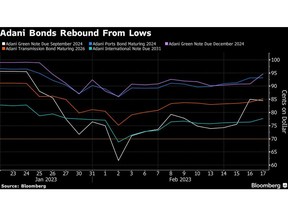During the days of easy money, one of the most widely tracked numbers in credit markets became an unfortunate punchline.

Article content
(Bloomberg) — During the days of easy money, one of the most widely tracked numbers in credit markets became an unfortunate punchline.
Advertisement 2
Article content
Ebitda, which stands for earnings before interest, taxes, depreciation and amortization — a figure that’s akin to a company’s cash flow and, thus, its ability to pay its debts — was instead mocked as a marketing gimmick. When bankers and private equity firms asked investors to buy a piece of their loans funding buyouts and other transactions, they would layer on so-called add-backs to earnings projections that, to some, defied reason.
Article content
“Ebitda: Eventually busted, interesting theory, deeply aspirational,” one Moody’s analyst joked in 2017. Sixth Street Partners co-founder Alan Waxman had a more blunt assessment, warning an audience at a private conference that such “fake Ebitda” threatened to exacerbate the next economic slump.
Advertisement 3
Article content
Now, amid rising interest rates, persistent inflation and warnings of a potential recession on the horizon, research from S&P Global Ratings is underscoring just how far from reality the earnings projections are proving to be.
As Bloomberg’s Diana Li wrote on Friday, 97% of speculative-grade companies that announced acquisitions in 2019 fell short of forecasts in their first year of earnings, according to S&P. For 2018 deals, it was 96% and 93% for 2017 acquisitions. Even after the economy was flooded with fiscal and monetary stimulus after the pandemic, about 77% of buyouts and acquisitions from 2019 were still short of their projected earnings, S&P’s research shows.
The bigger worry is that years of rosy earnings projections is masking the amount of leverage on the balance sheets of the lowest-rated companies. By 2019, before the Covid-19 pandemic sent markets tumbling the following year, add-backs were accounting for about 28% of total adjusted Ebitda figures used to market acquisition loans, Covenant Review data at the time showed. That was up from 17% in 2017.
Advertisement 4
Article content
The S&P analysts this week said the latest data reinforces their view that those Ebitda figures are “not a realistic indication of future Ebitda and that companies consistently overestimate debt repayment.”
“Together, these effects meaningfully underestimate actual future leverage and credit risk,” they wrote.
Elsewhere:
- Adani Group bonds rallied this past week as executives sought to reassure debt investors that the conglomerate will address its debt maturities in the coming months. Options included issuing private placement notes and using cash from operations to repay Adani Green Energy bonds maturing next year. The bonds had dropped to distressed levels after the Adani Group was targeted by short seller Hindenburg Research.
Advertisement 5
Article content
- Apollo Global Management and Goldman Sachs are planning private credit funds that will compete with Blackstone for rich European clients. While investors have long been able to participate in US private credit via business development companies, regulations and complexity has limited individuals’ access to such funds in Europe until recently.
- A rally in the bonds of China’s debt-laden developers — fueled by a series of policy steps to ease strains in the nation’s property sector – is now losing steam amid a persistent housing slump. A Bloomberg index of US dollar-denominated junk bonds in China recorded a loss for the second straight week, snapping a record 13 weeks of gains.
- Trouble is brewing in another corner of China’s credit market. Local government financing vehicles (LGFVs), which became the main buyers of half-finished projects of defaulted developers, have been caught up in a funding slump. The situation prompted a senior financial official from one of China’s poorest provinces to make a rare public plea for investors to buy bonds of its LGFVs.
—With assistance from Alice Huang, Bruce Douglas and Diana Li.
(Updates to add chart.)
Stay connected with us on social media platform for instant update click here to join our Twitter, & Facebook
We are now on Telegram. Click here to join our channel (@TechiUpdate) and stay updated with the latest Technology headlines.
For all the latest Business News Click Here
For the latest news and updates, follow us on Google News.



Comments
Postmedia is committed to maintaining a lively but civil forum for discussion and encourage all readers to share their views on our articles. Comments may take up to an hour for moderation before appearing on the site. We ask you to keep your comments relevant and respectful. We have enabled email notifications—you will now receive an email if you receive a reply to your comment, there is an update to a comment thread you follow or if a user you follow comments. Visit our Community Guidelines for more information and details on how to adjust your email settings.
Join the Conversation